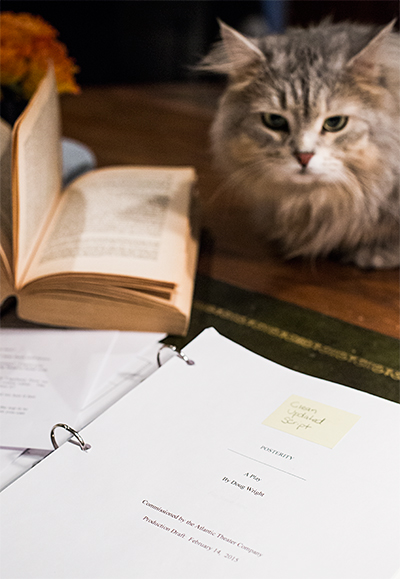Posterity Playwright Doug Wright on Procrastination, Martinis & an Inspiring Trip to Oslo

Doug Wright is a highly decorated playwright and librettist: He won a Tony Award and Pulitzer Prize for I Am My Own Wife and an Obie Award for Quills (for which he also wrote the Golden Globe-nominated screenplay). His book for the musical Grey Gardens received Tony and Drama Desk nominations. His other numerous credits include the book for the musical The Little Mermaid and the TV special Tony Bennett: An American Classic, which won seven Emmy Awards. Now Wright is directing the premiere of his play Posterity at the Atlantic Theatre Company. The scribe invited Broadway.com into the gorgeous penthouse apartment he shares with his husband (singer/songwriter David Clement) to talk Ibsen, secrets of the NYPL and more.
What’s the first thing you do when you sit down to write?
Check email compulsively and answer it exhaustively. Like most writers, I find a million reasons to procrastinate.
How do you stay motivated to finish a piece?
Usually you are writing to address some psychic struggle you have with yourself or the world, so the motivation is to unravel that riddle for yourself and get to tomorrow feeling you are a better, more whole person. I think that motivation is pretty profound.
How do you celebrate when you are finished?
A martini with my husband.
Was there a specific event that sparked the idea behind Posterity?
I took a trip to Oslo and visited the sculpture studio of Gustav Vigeland. There I saw six plaster casts of a study he did for a bust of Ibsen, and I was really moved by them. The first one was robust with a furious expression and giant mutton chops, and the second one was diminished. In the third one, he’d lost his hair and his eyes were fading. Finally, in the sixth study, it looked like a death mask. I read that the studies were made while Ibsen was desperately ill and his face was transforming due to his infirmity. So Vigeland never completed the definitive bust, but wound up with an amazing study of a man in the last stages of his life. I thought that was an amazing record of Ibsen’s last days and I wanted to write a play inspired by it.
What do you miss most about not having another person as the director?
Someone to blame.

Because of the topic of this work, which of your works best reflects the legacy you want to leave behind?
I’m always in love with the draft that’s in front of me, so I would probably answer this question with whatever draft is most current.
What essentials items do you like to have on hand when you write?
I have a number of rocks from the beach at Cadeques in Spain, which is where Salvador Dali spent a lot of his childhood and which inspired some of his earliest Surrealist landscapes. I keep them on my desk as talismans.

What’s the nitty, gritty hard work of being a playwright that no one ever told you?
Carving out a tenable financial life that allows you to indulge in the most beloved and unremunerative of crafts, which is writing plays. Balancing film and television and teaching jobs so that I can do the one thing I feel I’m truly good at is my greatest challenge. Dare I say it—even after the great privilege of four shows on Broadway and some very welcome moments of recognition beyond my wildest dreams—that remains a daily struggle.
What time of day do you get your best work done?
Between 11am and 3pm.
What’s your number one research secret?
Dial a librarian at the New York Public Library. Did you know they have a 24-hour service, where you can call and get a librarian on the line and ask him or her any research question under the sun and they will get back to you? Isn’t that amazing? God bless the New York Public Library.
What’s a play that changed your life?

What’s the best piece of advice you’ve ever received about writing?
The great director Lloyd Richards said, “Write for an audience that is smarter than you.” It’s a good one, right?
Name a playwright that influenced you.

What’s something you think all aspiring playwrights should do?
It’s challenging because theater tickets are expensive, but they should compulsively and devotedly go to the theater. See as much as they possibly can. Read as much as they possibly can. Also, I always say to students when I teach, “Write with all the urgency and passion and determination of a really good suicide note.” Let your plays be letters to the world from the deepest part of your soul.
What's your favorite line in Posterity?

